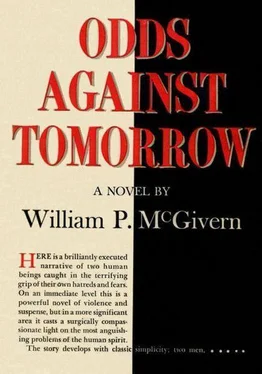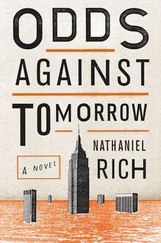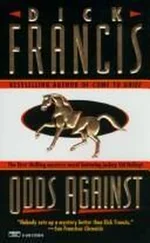William P. McGivern
Odds Against Tomorrow
To my brother Frank
with appreciation
For what seemed a long time he couldn’t make himself cross the street and enter the hotel. He stopped in the middle of the sidewalk and frowned at the revolving doors and canopied entrance, indifferent to the nighttime crowd drifting past him, his tall body as immobile as a rock in a stream. People edged around him carefully, for there was a look of tension in the set of his shoulders, and in the appraising frown that shadowed his hard even features.
It was the finality of the thing that worried him, he realized, not the consequences...
He knew the hotel, a middle-class commercial establishment close to the heart of the city, an old stone building that had been brightened up with a neon sign and shiny aluminum facings around a black and silver canopy. Lorraine had met him in the lobby once, he remembered; it wasn’t far from her job. They’d had some beers before going home.
Finally he lighted a cigarette and flipped the match toward the sidewalk, hardly noticing the people strolling in front of him. In the end he didn’t make up his mind at all; he simply started toward the hotel, urged forward by a pressure that seemed as inevitable as it was pointless. He sighed and thought: Why not? Why the hell not?
He stopped just inside the revolving doors and glanced alertly and cautiously around the lobby. Several groups of people stood talking near the newsstand, and a number of middle-aged businessmen sat about on hard, functional couches leafing through the evening papers. From a lounge off to his right, he heard the sound of loud juke-box music and the noisy laughter of men at the bar.
He skirted the groups of people and moved tentatively toward the reception desk at the end of the lobby, his hands pushed deep into the pockets of his old overcoat, the faintly worried frown still darkening his face. At the desk he waited behind a woman with two children tugging at her skirt, controlling his exasperation as the room clerk told her how to reach a suburb of the city by streetcar.
“My brother would have met us, but he had to work,” the woman said apologetically. “He’s with the gas company, and they can call him out any time.”
“You won’t have any trouble, I’m sure.”
“Yes — thanks a lot. Come on, children.”
The clerk, a young man with thin blond hair, smiled up at him. “Yes?”
“I want to see Mr. Novak. Frank Novak. What room is he in?”
“Is Mr. Novak expecting you?”
The question irritated him, and he took his hands from his pockets and drummed his fingers on the counter. “Sure, he’s expecting me. I wouldn’t be here if he wasn’t. What room’s he in?”
“I’ll ring him.” The clerk smiled impersonally. “It’s a house regulation. Whom shall I say is calling?”
His anger died quickly; he felt empty and foolish. “Sure, I see,” he said, shrugging as if the matter meant nothing to him. “But he knows me. My name is Slater. Earl Slater — he might know me as Tex Slater. That’s just a nickname. It stuck to me from the Army.”
“I’ll call Mr. Novak.”
Earl Slater put his big bony hands back into his pockets. Running on like a fool, he thought: Stuck to me from the Army. So what? What difference did that make? His irritability twisted around inside him, sharpening as it searched for some release or outlet.
“Room Ten-six,” the clerk said. “Mr. Novak would like you to come up.”
“Well, thanks,” Earl Slater said with a stiff little smile. He wanted to say something more, something that would readjust the exchange in his favor, but he couldn’t think of anything that might help; words were like crutches to him, difficult, makeshift means to a limited end. The clerk was already talking to someone else in any case, so Earl turned from the counter and walked slowly toward the elevators. What was the room number? Ten-six...
Facing the closed elevator door, he hesitated again, the frown deepening on his forehead. He lighted another cigarette quickly, and the tension in him charged his movements with a curious significance; he was like an animal in open country as he glanced nervously about the lobby, alert and graceful and wary.
Earl Slater was thirty-five years old, but he looked much younger; his complexion was the kind a woman might envy, clear, smoothly tanned, and he handled his rangy body like a well-conditioned machine, using it with a suggestion of careless precision and efficiency.
For all this, people weren’t often attracted to him; they might be touched by the hunger in his eyes, or impressed by the power of his body, but the cold and delicate anger in his face usually kept them at a distance.
He dropped his cigarette into a sand-filled urn as the elevator door slid open. Straightening his shoulders, he stepped into the empty car and said “Ten-six” to the operator, a young Negro in a green uniform. “That the tenth floor?”
“Yes, sir,” the colored boy said, snapping his fingers in a slow rhythm. “We’re going right up. Right up.” Turning, he smiled at Earl. “You hear the final score on the Eagles game?”
Earl Slater stared at him, his eyes shining and blank: he might not have been seeing him at all. “I don’t care about football,” he said gently.
“No?” The operator was still smiling. “What’s your sport then?”
“Riding nice quiet elevators,” Earl said, and let his soft Southern accent come down between them like a wall.
The colored boy’s smile faded until it was no more than a little twist at the corner of his mouth. “I read you, Mister,” he said, closing the door and throwing the starting lever with a lazy flick of his wrist. He hummed softly under his breath until the car came to a stop at the tenth floor. When the door opened, he inclined his head and said, “Don’t mention it, Mister. Nothing at all.”
Earl stared at him until the door closed, and then he let his breath out slowly, trying to check the frustrating anger pumping through his veins. A smart one, he thought. A real smart one. Turning he walked down the quiet corridor to Novak’s room, forgetting everything for the moment but an exasperating dissatisfaction with himself; why hadn’t he said something? That thought drummed in his mind. Why did he stand and take it like a block of wood?
Novak himself opened the door, grinning and extending a muscular hand. “Come on in. I’m Frank Novak,” he said. “You’re right on time, Slater.” Novak was short, but put together compactly and powerfully, a dark-haired, dark-complexioned man with cold little eyes. “You’re a big one,” he said grinning at Earl, surveying him with eyes that remained cold and hard. “Come on in. I want you to meet a friend, Dave Burke. Dave, shake hands with Earl Slater.”
Burke was standing in the middle of the room, a tall paunchy man with gray-blond hair and a complexion that had reddened by the rupturing of tiny blood vessels in his cheeks. He smiled and gave Earl an awkward little salute. “How’re you?” he said. “Sit down and make yourself comfortable. You feel like a drink?”
“All right,” Earl said. “Something light.”
“How about a whisky and water? That sound okay?”
“Sounds great,” Earl said. Burke laughed as if this were funny and turned to a dresser on which there were several bottles and a collection of glasses. “You use ice?” he said.
Earl didn’t see any ice around, so he said, “No, never mind.”
Burke laughed again, and Novak said, “Sit down, Earl. Take that chair. It’s better than the others. You want a cigar?”
Читать дальше

![Уильям Макгиверн - Завтра опять неизвестность [английский и русский параллельные тексты]](/books/35168/uilyam-makgivern-zavtra-opyat-neizvestnost-angli-thumb.webp)









